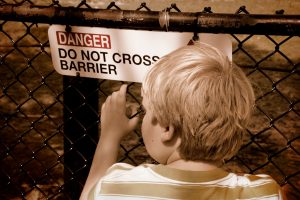Florida Premises Liability Law Allows Special Protections for Children, Even Trespassers
 Florida premises liability law places certain legal responsibilities on property owners to use reasonable care in protecting lawful guests from foreseeable dangers. Trespassers, however, are given very few protections, aside from the duty to avoid willful harm. The primary exception, as our Fort Myers child injury lawyers can explain, is with regard to young children.
Florida premises liability law places certain legal responsibilities on property owners to use reasonable care in protecting lawful guests from foreseeable dangers. Trespassers, however, are given very few protections, aside from the duty to avoid willful harm. The primary exception, as our Fort Myers child injury lawyers can explain, is with regard to young children.
It’s called the “attractive nuisance doctrine.” Although trespassers have no right to expect landowners to maintain a safe property on which they can trespass, it’s different for young children. Unlike adults, it’s understood small kids lack the ability to perceive danger or make reasonable judgments about how to protect themselves. Therefore, if there is something dangerous on site that might be interesting to curious youths, landowners have a responsibility to take measures to keep them out and protect them from their own misjudgment.
As noted in the 1990 Florida Supreme Court case of Martinello v. B&P USA Inc., attractive nuisance isn’t a separate cause of action or theory of liability. Instead, it’s a doctrine that imposes a duty on the landowner or occupant to trespassing children that otherwise wouldn’t exist under circumstances of non-liability to trespassers. The exception is spelled out in F.S. 768.075.
That doesn’t mean property owners are required to guarantee the safety of children on their property or that a child hurt on someone else’s property is automatically going to prevail in a claim for damages. What it means is that where the elements of the doctrine are met, kids who trespass on someone else’s property are afforded the same protection as an invitee on the premises.
In other words, when an attractive nuisance is present, landowners must take precautionary measures to address dangerous conditions, warn about it, or keep kids away from it. If they don’t, they can be held liable for the resulting injuries, though the child can be held comparatively negligent, which can reduce their total damages.
The doctrine in Florida premises liability cases is generally only applicable in situations where the land owner can reasonably anticipate the presence of young children, and the duty only extends to protective measures that can be taken without undue burden on the landowner.
What Exactly is an Attractive Nuisance in Florida Premises Liability Law?
Essentially, attractive nuisances are any instrumentality on a property – natural or man-made – that’s going to be compelling to children but also dangerous; because of their age, however, they aren’t able to understand the risk.
There is no hard-and-fast rule as to what exactly is or is not an attractive nuisance, though a few specifics are outlined in F.S. 823.08. These include:
- Refrigerators.
- Clothing washers and dryers.
- Deep-freeze lockers or ice boxes.
- Other air-tight units that still have the door attached.
This isn’t an exhaustive list, though. Swimming pools and hot tubs are one of the most commonly cited attractive nuisances in Florida child trespassing injury cases. There are statutes in Florida requiring protections around public and residential pools (fencing, locks, etc.) for this very reason. Rusty trampolines, old lawn equipment/machines or other potentially dangerous items left out in the open that might draw children can be considered attractive nuisances as well.
The U.S. Supreme Court has taken the position that the general condition of the property itself (and not necessarily the thing that caused the child’s injury) is sufficient to apply the attractive nuisance doctrine. For example, if a child is lured onto a property by a swimming pool, but the wire surrounding is dangerous and causes injury, it may be possible to still find the property owner liable – even if it wasn’t the wire that attracted the child to the property in the first place.
If your child is injured by a dangerous condition on someone else’s property – even if they were trespassing – you may have a claim for damages under Florida premises liability law. Our Lehigh Acres child injury lawyers can help answer your questions and advise you of the next best step.
If you are injured in Fort Myers, Port Charlotte, Sarasota, Cape Coral, Naples, or Key West, contact Garvin Injury Law at 800.977.7017 for a free initial consultation.
Additional Resources:
Martinello v. B&P USA Inc., 1990, Florida Supreme Court
More Blog Entries:
Pandemic Pet-Buying Boom May Lead to More Florida Dog Bite Injuries, Jan. 13, 2021, Fort Myers Injury Lawyer Blog





 Florida Personal Injury Lawyer Blog
Florida Personal Injury Lawyer Blog










